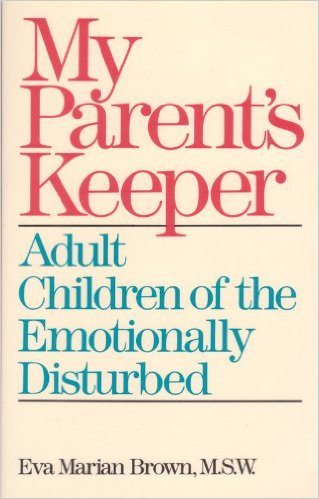 |  | My Parent's Keeper: Adult Children of the Emotionally Disturbed
Author: Eva Marian Brown, MSW
Publisher: New Harbinger Publications (January 1, 1989)
Paperback: 148 pages
ISBN-10: 0934986789
ISBN-13: 978-0934986786


|
Book DescriptionThis book is written for and about the many people who grew up with a parent with severe emotional problems. The book is organized in such a way that the initial chapter will give the reader a description of the typical background and problems of this group of people... The later chapters talk about ways of overcoming these problems.
Children raised by an unstable parent often become "parentified" children, entering into a role reversal in which the child, instead of being nurtured and protected, takes care of the parent's needs. There are long term consequences of this role reversal. As adults, these parentified child find relationships frustrating and confusing. They have difficulty knowing and expressing their feelings and needs. Any kind of vulnerability is frightening. Intimacy is both craved and feared.
This book is a comforting and supportive guide to recognizing and changing the limiting childhood patterns you've carried into your adult relationships. You'll be able to recognize yourself yourself in the rich and revealing quotes the author has included form many hour of interviews with people who grew up with a disturbed parent.
Table of ContentsPart I: EARLY HURTS AND OLD WOUNDS
Chapter 1: Parentified Children
Chapter 2: Survivor's Guilt: The Price of Leaving Home
Chapter 3: Crazy Minnie's Daughter Mary --Like Mother, Like Child?
Chapter 4: Emotions and Control --Learning to Allow Intimacy
Part II: TURNING THE PAST AROUND
Chapter 5: Reclaiming Your Feelings
Chapter 6: If You're Mad I Must Be Bad --Building Self Esteem
Chapter 7: Overcoming Blocks to Risk-Taking
Chapter 8: A Program of Graduated Risk-Taking
Chapter 9: Mary: An Example of Risk-Taking
Part III: ALONG THE ROAD TO RECOVERY
Chapter 10: Messages of Hope: ACMI's Talk to Each Other
Chapter 11: For the Helping Professional: Working with the ACMI
About the AuthorEva Marian Brown, LCSW, is a psychotherapist practicing in Oakland, CA. She earned her masters in social work from UC, Berkeley. In her general practice she provides individuals, couples, and group psychotherapy to adults. She also specializes in working with adults who grew up with a parent suffering from a serious psychological impairment.





 Poll
Poll
